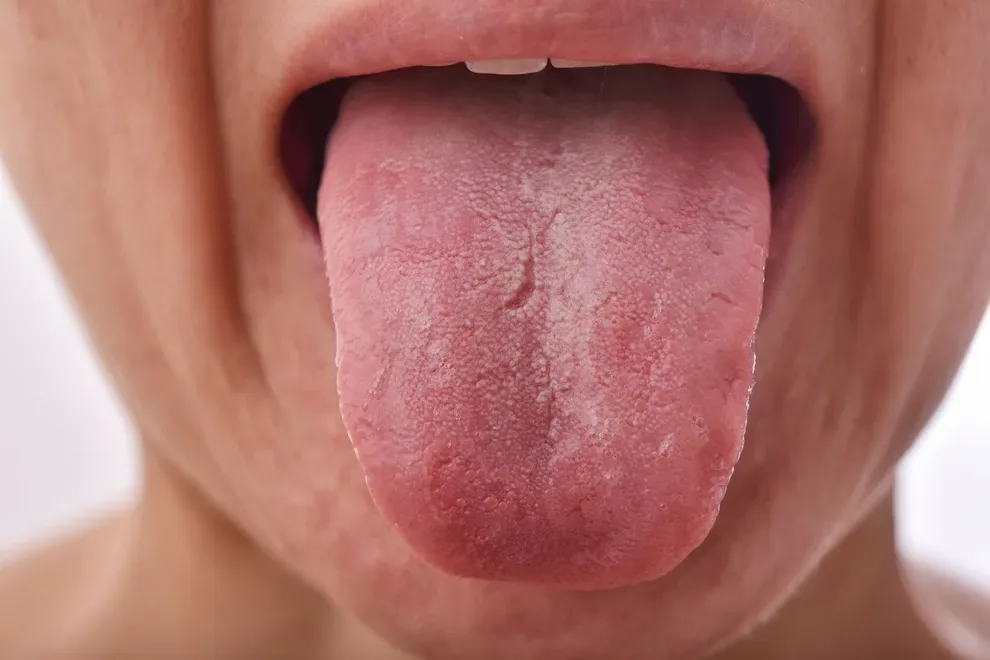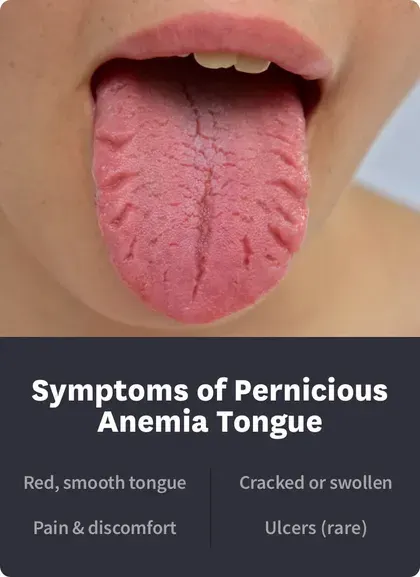Pernicious Anemia Tongue: Causes, Symptoms & Treatment Options

Table of Contents
- Symptoms
- Treatment Options
- Prevention
- Why Does Pernicious Anemia Change Your Tongue?
- What Does an Anemic Tongue Look Like?
- Causes Pernicious Anemia
- Diagnosis
Pernicious anemia is a condition that occurs when the human body can’t make enough healthy blood red cells. In most cases, pernicious anemia is linked to an individual’s inability to absorb B12 properly.
However, pernicious anemia may also be linked to how a person processes B12. This is particularly true when certain medications, recent surgeries or infections prevent the body from absorbing B12.
Pernicious anemia often presents itself by altering the appearance of your tongue.
Why Does Pernicious Anemia Change Your Tongue?
Researchers writing for Medscape say about half of all people who develop pernicious anemia have an anemic tongue. The symptom is so common that it’s one of the signs doctors look for when they’re trying to diagnose pernicious anemia in their patients.
Pernicious anemia changes your tongue by reducing your ability to absorb vitamin B12. Your body needs this vitamin to create new cells and break down old ones. The cells on your tongue, especially the filiform papillae that cover its surface, are constantly growing and changing. Without enough vitamin B12, your body can’t make new cells. Your tongue starts to look and feel different as new cells aren’t created to replace the old ones.
What Does an Anemic Tongue Look Like?
Pernicious anemia can cause a series of changes to your tongue. These symptoms are common:
Your tongue looks red (instead of pink).
The surface of the tongue is smooth instead of furred with papillae.
The sides of your tongue are especially smooth.
You may feel a burning or soreness, especially in the back third of your tongue.
What Causes Pernicious Anemia?
Pernicious anemia that leads to tongue symptoms is often caused by a deficiency in vitamin B12 or a problem with the absorption of B12. This may be caused by a number of issues, including these:
Stomach, intestinal, or gastric bypass surgery
A bacteria problem in your small intestine, possibly small intestine bacterial overgrowth (SIBO)
Tapeworm or parasites
Certain medications
A diet lacking in B12 (more common in vegan and vegetarians)
Digestive, endocrine, and autoimmune disorders
Other conditions can result in tongue problems that look like pernicious anemia tongue. These include the following:
Allergic reactions or food sensitivities
Dry mouth
Oral herpes
Sores
Injuries and burns
How Is Pernicious Anemia Diagnosed?
Researchers writing for StatPearls say diagnosing pernicious anemia can be difficult, as no single blood test can tell doctors whether their patients have the condition or not. Instead, doctors must use a series of examinations and tests to assess what might be causing your symptoms.
Your doctor might begin by performing a physical examination. If your skin is yellow-tinged or very dry, that’s a sign of anemia. You may also have an anemic tongue and a fast heartbeat.
Neurological tests may come next. Your doctor may assess your sensitivity to light touches or vibration in your toes and feet.
Your doctor may also ask about your family history of autoimmune conditions that are associated with pernicious anemia, including the following:
Diabetes type 1
Vitiligo
Hyperthyroidism
If your doctor suspects you have pernicious anemia based on your examination, further tests can include blood panels, bone marrow biopsies, and endoscopies. Your doctor will look for evidence that you’re not processing vitamin B12, and these tests will help to determine why the problem is happening.
Symptoms

The primary symptom related to pernicious anemia and your oral health is typically a red, smooth-looking tongue. This is often referred to as glossitis by medical professionals. In some cases, it can be painful or uncomfortable.
There are different types of glossitis.
Acute glossitis: This is a sudden tongue reaction with serious symptoms, usually caused by an allergic reaction or food sensitivity.
Chronic glossitis: Recurring tongue problems are likely caused by a chronic health problem like diabetes or anemia.
Idiopathic glossitis: This is tongue inflammation that is commonly linked to a gluten sensitivity or celiac disease.
Atrophic glossitis: The tongue loses its color and some of its papillae (the little bumps that help hold food for chewing and contain taste buds).
Other symptoms can include a cracked or swollen-looking tongue. Individuals who are dealing with certain blood disorders may notice ulcers or other types of irritation within the mouth. A swollen-looking tongue that appears thicker than normal can also be a sign of pernicious anemia. Some patients describe the tongue as “beefy” when this occurs.
Treatment Options
When your pernicious anemia has been diagnosed, your doctor can craft an appropriate treatment plan to help you look and feel better. Typically, that treatment plan involves vitamin replacement.
Since people with pernicious anemia can’t make or digest enough vitamin B12, doctors use injections to help. A typical treatment schedule looks like this:
| B12 Injection Amount | How Often? |
First 1–2 weeks | 1,000 micrograms | Every 24–48 hours |
Next 1–2 months | 1,000 micrograms | Weekly |
Next 2–3 months | 1,000 micrograms | Every 2 to 3 months |
When this period has passed, most people can take oral doses of vitamin B12. Your doctor can help you choose a supplement with enough power to help you stay healthy.
Regular evaluations may be required over time as well, particularly if you start to see signs and symptoms of pernicious anemia returning.
Prevention
Preventing pernicious anemia and symptoms like glossitis, mouth ulcers, and a swollen, beefy tongue is highly dependent on your personal case. Working with your doctor is usually your best bet. Here are a few common prevention methods you can use going forward once you and your doctor have treated the initial symptoms:
Improve your diet and add B12-rich foods to your pantry and refrigerator. Foods like yogurt, chicken, beef, lentils, soybeans, and spinach can help.
Add a multivitamin to your diet. You may also want to consider a B12 supplement going forward if you don’t have much B12 in your diet or you have trouble processing it.
Consider vitamin B12 shots if your doctor thinks they may be helpful for you. Many people find that getting B12 shots is a little more convenient than taking supplements or altering their diet dramatically, particularly if they have a problem absorbing normal amounts of B12.
Pernicious anemia can seem scary. After all, it has a rather formal-sounding medical name. Pair that with unusual tongue-related symptoms, and it’s easy to feel overwhelmed. The good news is that pernicious anemia can usually be treated. For individuals without these autoimmune issues, supplements or simply changing your diet can make a big difference. With a little effort on your part, you can leave pernicious anemia behind for good.
